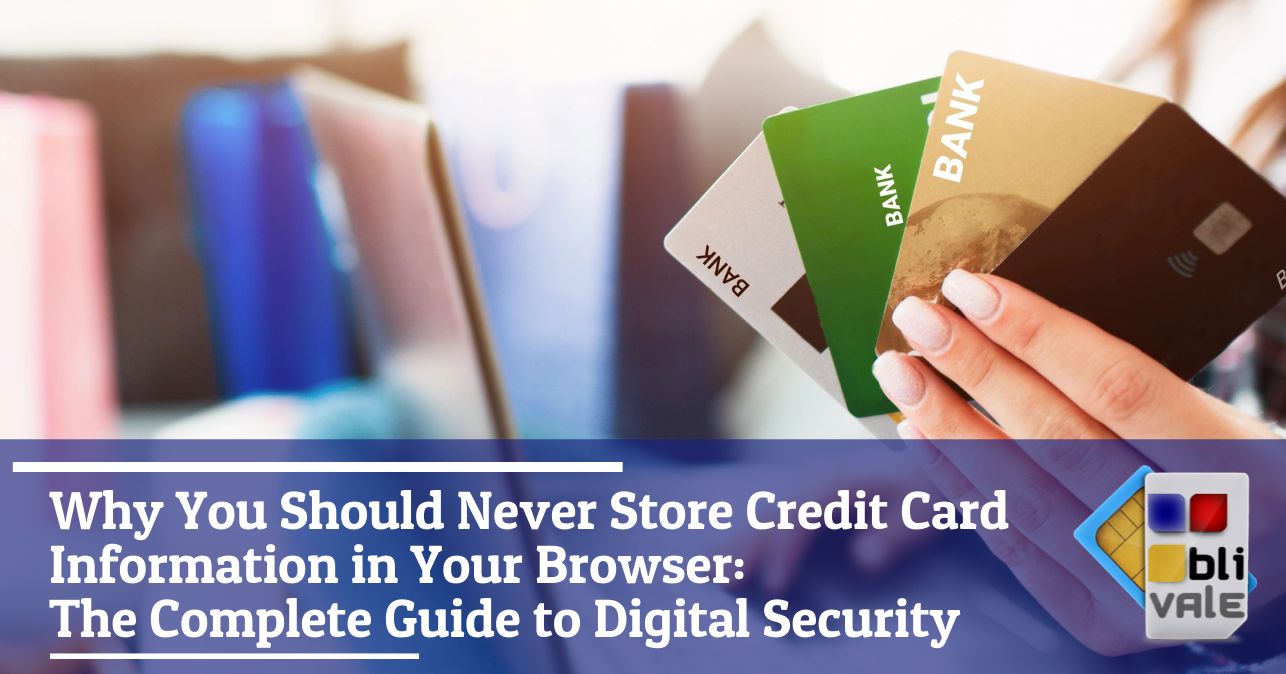Convenience comes at a price, and when it comes to storing your credit card information in your browser , that price may be much higher than you realize. Every day, millions of users succumb to the temptation of the “Save card information” offered by Chrome, Firefox, Safari and other browsers, unaware of the risks they are taking.
The Illusion of Security: Why Your Browser Isn't the Right Place for Your Financial Data
When your browser asks if you want to save your credit card information, you’re essentially creating a local database of your most sensitive information . This data is stored in easily accessible files on your device, often with encryption that can be bypassed by skilled cybercriminals.
Cybersecurity experts are unanimous on this point: Brian Krebs, a well-known journalist specializing in cybersecurity, has repeatedly highlighted how the automatic storage of card data represents one of the most underestimated vulnerabilities by ordinary users. Even the NIST (National Institute of Standards and Technology) strongly advises against this practice in its guidelines for consumer security.
The Vulnerabilities Hidden Behind Convenience
The main vulnerability is that this data is not as secure as you think. While modern browsers use encryption, the decryption keys are often stored on the device itself, making unauthorized access possible for those who know where to look.
Public WiFi Networks: A Cybercriminal's Paradise
The danger is greatly amplified when you connect to unprotected public WiFi networks . Airports, hotels, coffee shops, shopping malls – these places are veritable hunting grounds for cybercriminals.
How Attacks on Public Networks Work
When you are connected to a public WiFi network and access a website that has your credit card information stored, you are potentially transmitting sensitive information over a connection that can be intercepted. Man-in-the-middle attacks are particularly effective in these contexts.
Packet sniffing attacks allow criminals to intercept all traffic passing through the network, including credit card information that the browser may automatically transmit during the auto-complete process.
Concrete Threats: An Alarming Panorama
Device theft and loss
Statistically, millions of devices are lost or stolen every year. If you have stored your card details in your browser, anyone who gains access to your device can potentially use this information to make fraudulent purchases.
Specialized Malware and Viruses
There are malware specifically designed to extract credit card data stored in browsers. Trojans such as Zeus, Carbanak and more recently Emotet, have shown how easy it is to access this data once the system is compromised.
Social engineering attacks
Criminals can use social engineering techniques to convince you to provide access to your device or credentials, making it even easier for them to access stored data.
Browser vulnerability
Even the most secure browsers can have zero-day vulnerabilities that allow unauthorized access to stored data. Security updates often arrive after the vulnerability has already been exploited.
How to Protect Yourself: Advanced Security Strategies
Never use public networks for financial transactions
The golden rule is simple: never make financial transactions on public WiFi networks . This includes not only online purchases, but also accessing banking services or payment applications.
If you absolutely must make an urgent transaction, always use your smartphone's data connection rather than public WiFi. Cellular networks, while not perfect, offer a significantly higher level of security.
Using professional VPNs
If you absolutely must connect to public networks, investing in an enterprise-grade VPN is essential. Not all VPNs are created equal; many free or cheap VPNs may actually compromise your security even further.
For those looking for a professional and reliable solution, BLIVALE offers VPN (Virtual Private Network) services specifically designed to ensure maximum security in online transactions. You can find more information and purchase the service at the link: VPN BLIVALE . These professional VPN services use advanced encryption protocols and offer the protection you need when you absolutely must use unsecured connections.
If you are thinking of taking a trip alone or with friends or for work, do not forget the importance of staying connected wherever you are. For unlimited Internet connection, contact BLIVALE where you can get unlimited Internet according to the destinations:
For unlimited plans like data BLIVALE guarantees free roaming anywhere in the world, no additional or hidden costs. Don't let the lack of connection stop you; get ready to explore the world with freedom and spontaneity.
How to remove card data from major browsers
Google Chrome: Complete Cleanup
Open Chrome and go to Settings (three dots at the top right)
Select Autofill and passwords
Click on Payment Methods
Delete all saved payment methods
Go to Advanced Settings → Reset and Cleanup
Select Clear browsing data → Advanced
Make sure Autofill Form Data is selected
Microsoft Edge: Safe Removal
Open Edge and click on the three dots at the top right
Go to Settings → Profiles
Select Payment Information
Delete all saved cards
Go to Privacy, Search and Services
Under Clear browsing data , click Choose what to clear.
Select Form Data and delete
Opera: Complete deletion
Open Opera and go to Settings (Alt+P)
Select Advanced → Privacy & Security
Click on Clear browsing data
On the Advanced tab , select Autofill form data
For payment methods: Settings → Advanced → Features → Autofill
Safari (Mac): The Ultimate Cleanup
Open Safari and go to Preferences (Cmd+,)
Select the Autofill tab
Uncheck Credit Cards and click Edit
Delete all stored cards
Go to History → Clear History
Select All history and confirm
The Traveler Solution: Secure eSIMs for Secure Transactions
When you travel, the security of your financial transactions becomes even more critical. Networks at hotels, airports, and public places are often compromised or monitored.
Why eSIMs are a game changer in security
The new generation eSIMs offer a higher level of encryption than traditional WiFi connections. Services like BLIVALE provide end-to-end encrypted connections specifically designed to protect financial transactions.
Pre-Travel Strategic Planning
Planning ahead is key . Purchasing and setting up your eSIM before you leave, activating it on the day or 24 hours before your trip, ensures you always have access to a secure connection without having to rely on potentially compromised public networks.
The pay-as-you-go or unlimited GB of professional eSIMs allow you to always maintain an active secure connection, eliminating the temptation to connect to public networks to save data.
Best practices for digital financial security
Always-on two-factor authentication
Make sure all your bank accounts and financial services have two-factor authentication (2FA) enabled. Use authenticator apps rather than SMS, which can be intercepted.
Constant monitoring of transactions
Set up instant notifications for all transactions, even small ones. Criminals often test stolen cards with small purchases before making larger transactions.
Using virtual cards
Many banks now offer virtual credit cards for online purchases. These cards have temporary numbers and preset spending limits, dramatically limiting the damage if compromised.
Experts' Verdict: Never Compromise on Financial Security
The cybersecurity community is unanimous: the convenience of saving card data in the browser is never worth the risk it entails. As highlighted by the SANS Institute in its latest research, targeted attacks on locally stored financial data are constantly increasing.
Troy Hunt , creator of the service HaveIBeenPwned, has documented numerous cases where card data “securely stored” in browsers has been compromised in large-scale cyber attacks.
The security of your financial data is not an area where you can afford to compromise. Every second saved by not having to re-enter your card details can cost you hours, days, or weeks of troubleshooting issues resulting from identity theft or fraudulent transactions.
Remember : true convenience lies in the peace of mind of knowing that your data is safe, not in saving a few seconds during an online purchase.
Conclusions: Safety first
In an era where digital financial transactions are the norm, protecting your banking information is no longer an option, but an absolute necessity. Storing credit card information in your browser is a significant vulnerability that can turn today's convenience into tomorrow's financial disaster.
Cyber threats are constantly evolving, becoming more sophisticated and targeted. What seems safe today may already be compromised tomorrow. Cybersecurity experts agree: prevention is the only truly effective defense.
The immediate action plan
If after reading this article you realize that you have stored sensitive data in your browser, act immediately :
Immediately remove all stored card data by following the guides provided
Change passwords for all online financial services
Enable two-factor authentication wherever possible
Monitor your bank statements closely over the next few months.
Invest in a secure connection for your future travels
An investment in your peace of mind
Digital security is not a cost, but an investment in your peace of mind . The time you spend protecting your financial data today will potentially save you weeks of stress, paperwork, and financial loss in the future.
Adopting advanced security practices, such as using encrypted eSIMs when traveling or completely eliminating sensitive data from browsers, isn't paranoia: it's applied digital intelligence .
The Future of Financial Security
The cyber threat landscape will continue to evolve, but the fundamental principles of digital security remain constant. Never store sensitive data in easily accessible locations, always use secure connections for financial transactions, and be proactive in protecting your data.
Cybersecurity is not a destiny, but a choice. A choice you make every day, with every click, with every connection. Always choose security, even when it seems less convenient. Your financial future will thank you for it.
Don't wait to become a statistic. Protect your financial data today.









